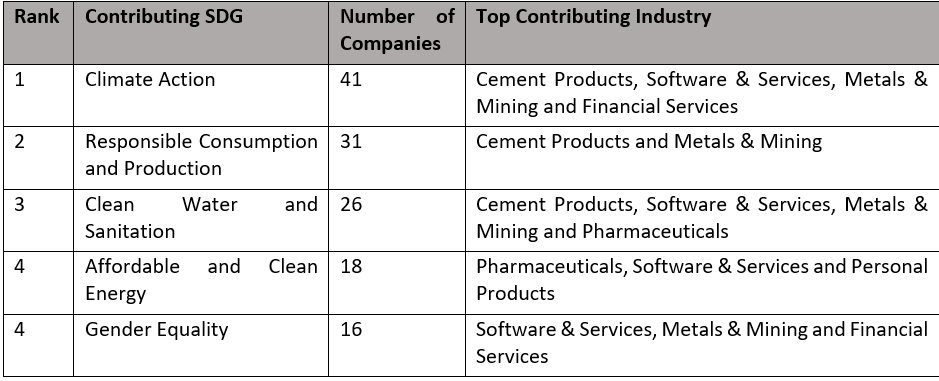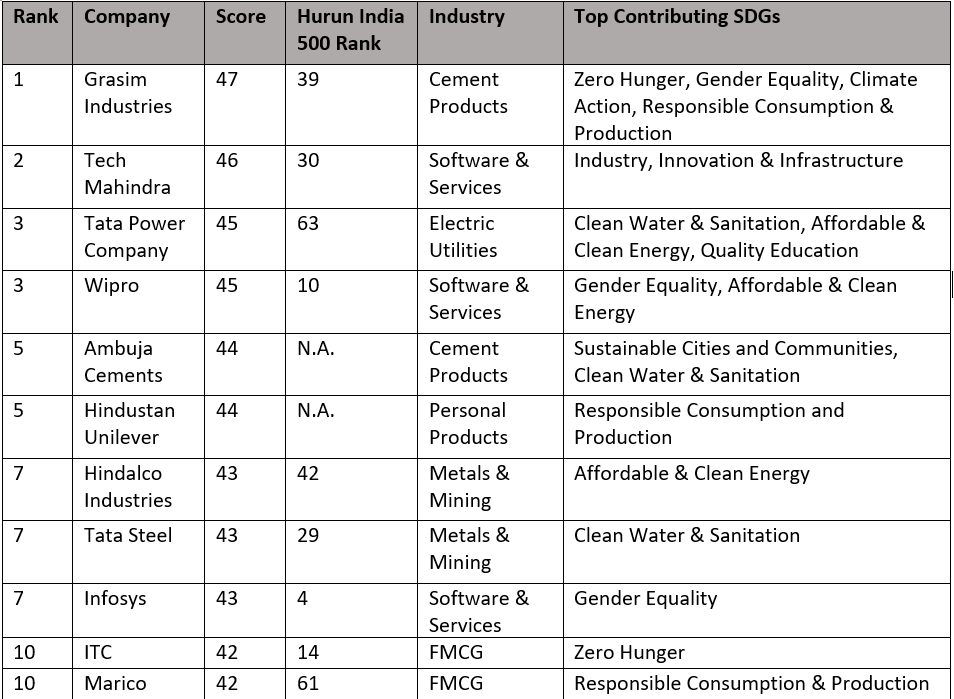Capri Global Capital Hurun India Impact 50: 2021 list has brought to the forefront a pivotal discussion in the realm of sustainability and corporate responsibility. This list, which ranks the top 50 companies headquartered in India based on their alignment with the United Nations’ 17 Sustainable Development Goals (SDGs), offers insights into the companies making significant strides towards a more sustainable future.
Here is the list of the top 10 companies that performed extraordinarily:
Grasim Industries has emerged as a frontrunner, topping the rankings with a cumulative sustainability score of 47. The remarkable aspect of their achievement is that they have made tangible contributions towards all 17 SDGs, with specific time-bound targets for four of them. Tech Mahindra secures the second position on the list with a sustainability score of 46, closely followed by Tata Power Company and Wipro.
The sustainability score of companies in the 2021 Capri Global Capital Hurun India Impact 50 list was calculated based on their contributions to the United Nations’ 17 SDGs. Each of the 17 SDGs was marked out of 5, with an additional maximum of 3 bonus points for time-bound measurable goals, documented improvement, and excess CSR spend 2. The final score was calculated out of 146 and then indexed to 100.
It also mentions the specific goals and how many companies work to achieve them.

These rankings emphasize that these companies have recognized the importance of sustainability and actively integrated it into their corporate DNA. They are not just profit-centric entities but changemakers actively working towards a better, more sustainable world.
However, it is equally essential to recognize that sustainability is not confined to a select few industries or companies. It’s a responsibility that extends across sectors, from cement to Fast-Moving Consumer Goods (FMCG), pharmaceuticals, and personal product manufacturing.
The question arises: is it enough? Or they can do more? If yes, then how?
Suppose we select specific industries that use channel partners to provide the products in the market. In that case, green loyalty programs can help them improve their sustainability score and help companies achieve their target SDGs. Here is how:
Green Loyalty Programs: A Paradigm Shift for Industries
One innovative and practical approach that industries can adopt is the implementation of Green Loyalty Programs (GLPs). These programs enhance brand loyalty and play a pivotal role in transforming industries towards sustainability. Here’s how:
1. Cement Industry: Reducing Carbon Footprints
The cement industry is known for its significant carbon emissions, making it a critical contributor to global greenhouse gas emissions. Companies like Grasim and Ambuja constantly try to reduce their carbon footprint by using ingredients like fly ash, rice husk, and other additives. But when it comes to distribution, they can improve it through GLP.
Cement companies can encourage customers through channel partners to choose sustainable building materials and practices by introducing Green Loyalty Programs. For that, channel partners will get better incentives for promoting low-carbon footprint products and sustainable construction methods. Ultimately, it can significantly reduce carbon emissions, in line with SDG 13 (Climate Action).
2. Pharmaceuticals: Ethical Sourcing and Accessibility
Pharmaceuticals must address ethical sourcing, waste disposal, and accessibility to life-saving medicines.
Green Loyalty Programs can promote ethical sourcing of raw materials and responsible waste disposal methods. Furthermore, these programs can incentivize medicines to reach underserved communities, contributing to SDG 3 (Good Health and Well-being) and SDG 12 (Responsible Consumption and Production).
3. Personal Products Manufacturing: Sustainable Ingredients and Eco-friendly Practices
Personal product manufacturing often involves non-sustainable ingredients and generates significant waste.
Manufacturers can use Green Loyalty Programs that reward consumers for choosing products with sustainable ingredients and eco-friendly practices. Encouraging waste reduction through recycling and responsible consumption contributes to SDG 12 (Responsible Consumption and Production) and SDG 14 (Life Below Water).
Through GLP, companies can collaborate with brands that build eco-friendly products. This way, they can promote the green rewards and help the greener brands sustain in the competitive market. Additionally, companies can add scores by adding SDG 17 (Partnership for the Goals).
The Road Ahead: Transparency and Accountability
Implementing Green Loyalty Programs is just the first step. Regular, transparent reporting on sustainability efforts, achievements, and impacts is essential. It builds trust and accountability, which is vital for making progress toward the SDGs.
In conclusion, the 2021 Capri Global Capital Hurun India Impact 50 list serves as a reminder of companies’ pivotal role in shaping a more sustainable future. While some have already made significant strides, adopting it presents an innovative pathway for various industries, including cement, FMCG, pharmaceuticals, and personal product manufacturing, to improve their sustainability scores and actively contribute to achieving SDGs. Sustainability is not a solitary journey but a collective responsibility encompassing industries, companies, and consumers.








